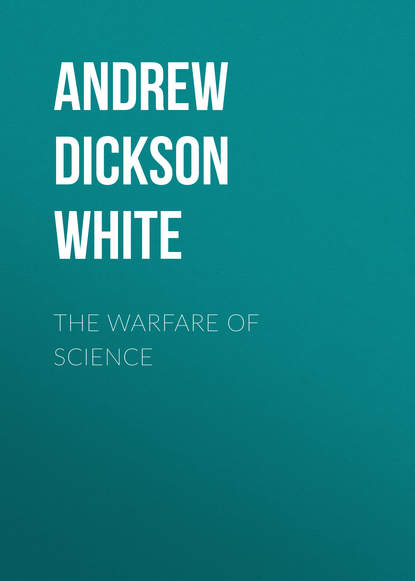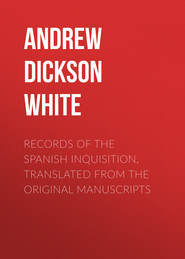По всем вопросам обращайтесь на: info@litportal.ru
(©) 2003-2025.
✖
The Warfare of Science
Настройки чтения
Размер шрифта
Высота строк
Поля
Martin, p. 227.
55
Martin, p. 243.
56
For the persecution of Galileo's memory, see Th. Martin, chaps. ix and x. For documentary proofs, see de l'Epinois. For a collection of the slanderous theories invented against Galileo, see Martin, final chapters and appendix. Both these authors are devoted to the Church, but, unlike Monsignor Marini, are too upright to resort to the pious fraud of suppressing documents or interpolating pretended facts.
57
See Martin, pp. 401, 402.
58
See de l'Epinois, p. 35, where the document is given in its original Latin.
59
See translation of the abjuration in appendix to Private Life of Galileo, London, 1870.
60
See Marini, who manipulated the original documents to prove this. Even Whewell appears to have been somewhat misled by him; but Whewell wrote before de l'Epinois had shown all the documents, and under the supposition that Marini was an honest man.
61
See Marini.
62
See Epinois and Th. Martin, passim.
63
See pages 136, 144, and elsewhere in Martin, who, much against his will, is forced to allow this.
64
Martin, pp. 146, 147.
65
See Martin, p. 145.
66
See note on condemnation of Kopernik.
67
For the attempt to make the crime of Galileo a breach of etiquette, see Dublin Review, as above. Whewell, vol. i., 393. Citation from Marini: "Galileo was punished for trifling with the authorities to which he refused to submit, and was punished for obstinate contumacy, not heresy." The sufficient answer to all this is, that the words of the inflexible sentence designating the condemned books are: "Libri omnes qui affirmant telluris motum." See Bertrand, p. 59. As to the idea that "Galileo was punished not for his opinion, but for basing it on Scripture," the answer may be found in the Roman Index of 1704, in which are noted for condemnation "Libri omnes docentes mobilitatem terræ et inmobilitatem solis." For the way in which, when it was found convenient in argument, Church apologists insisted that it was "the Supreme Chief of the Church, by a pontifical decree, and not certain cardinals," who condemned Galileo and his doctrine, see Father Lecazre's letter to Gassendi in Flammarion, Pluralité des Mondes, p. 427, and Urban VIII.'s own declarations as given by Martin. For the way in which, when necessary, Church apologists asserted the very contrary of this, declaring that "it was issued in a doctrinal decree of the Congregation of the Index, and not as the Holy Father's teaching," see Dublin Review, September, 1865. And for the most astounding attempt of all, to take the blame off the shoulders of both pope and cardinals, and place it upon the Almighty, see the article above cited, in the Dublin Review, September, 1865, p. 419. For a good summary of the various attempts, and for replies to them in a spirit of judicial fairness, see Th. Martin, Vie de Galilée, though there is some special pleading to save the infallibility of pope and Church. The bibliography at the close is very valuable.
68
For Baronius's remark, see De Morgan, p. 26. Also, Whewell, vol. i., p. 394.
69
For an exceedingly striking statement, by a Roman Catholic historian of genius, as to popular demand for persecution, and the pressure of the lower strata, in ecclesiastical organizations, for cruel measures, see Balmès, Le Protestantisme comparé au Catholicisme, etc., 4th ed., Paris, 1855, vol. ii. Archbishop Spaulding has something of the same sort in his Miscellanies. L'Epinois, Galilée, pp. 22, et seq., stretches this as far as possible, to save the reputation of the Church in the Galileo matter.
70
Humboldt, Cosmos, London, 1851, vol. iii., p. 21. Also, Lange, Geschichte des Materialismus, vol. i., p. 222, where the letters of Descartes are given, showing his despair, and the giving up of his best thoughts and works to preserve peace with the Church. Also, Saisset, Descartes et ses précurseurs, pp. 100, et seq. Also, Jolly, Hist, du Mouvement Intellectuel au XVI
Siècle, vol. i., p. 390
71
Libri, pp. 149, et seq.
72
Fromundus, speaking of Kepler's explanation, says: "Vix teneo ebullientem risum." It is almost equal to the New York Church Journal, speaking of John Stuart Mill as "that small sciolist," and of the preface to Dr. Draper's recent work as "chippering." How a journal generally so fair in its treatment of such subjects can condescend to use such weapons, is one of the wonders of modern journalism. For Protestant persecution of Kepler, see vol. i., p. 392. Among other things, Kepler's mother was declared a witch, and this was followed by a reminder of the Scriptural injunction, "Ye shall not suffer a witch to live."
73
For Cassini's position, see Henri Martin, Hist. de France, vol. xiii., p. 175.
74
Daunou, Études Historiques, vol. ii., p. 439.
75
Bossuet, see Bertrand, p. 41.
76
For Hutchinson, see Lyell, Principles of Geology, Introduction.
77
Boscovich. This was in 1746, but in 1785 Boscovich seemed to feel his position in view of history, and apologized abjectly. Bertrand, pp. 60, 61. See also Whewell's notice of Le Sueur and Jacquier's introduction to their edition of Newton's Principia. For a clear statement of Bradley's exquisite demonstration of the Copernican theory by reasonings upon the rapidity of light, etc., and Foucault's exhibition of the rotation of the earth by the pendulum experiment, see Hoefer, Hist. de l'Astronomie, pp. 492, et seq. For the most recent proofs of the Copernican theory, by discoveries of Bunsen, Bischoff, Benzenburg, and others, see Jevons, Principles of Science.
78
See note in introduction to Lyell's Principles of Geology; also, Buckle, Hist. of Civ. in England, vol. i., chap. i.







